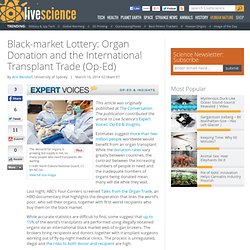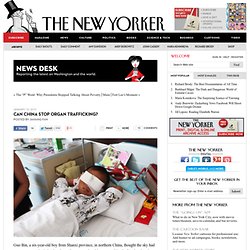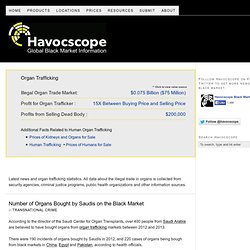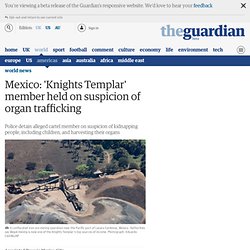

Black-market Lottery: Organ Donation and the International Transplant Trade. This article was originally published at The Conversation.

The publication contributed the article to Live Science's Expert Voices: Op-Ed & Insights. Estimates suggest more than two million people worldwide would benefit from an organ transplant. Image-383998-galleryV9-tyis. Medscape Access. Jews Arrested over Organ Trafficking Case- US Kids Organs to feed Israel´s Health System. Can China Stop Organ Trafficking? Guo Bin, a six-year-old boy from Shanxi province, in northern China, thought the sky had gone permanently dark when he woke up, one day this summer, bloody-faced and crying near his parents’ home.

“We originally thought he had fallen down and smashed his face,” Guo’s father, a farmer, told a local television station. “We didn’t notice that his eyes were gone when we first discovered him.” But then he saw that there were only pits where his son’s eyeballs should have been. The boy told his mother that the last words spoken to him by the still-unidentified woman who kidnapped and drugged him were “Don’t cry, and I won’t gouge your eyes out.”
Immediately after news of the savage assault broke, an apprehensive public leapt to the conclusion that the perpetrators were driven by an obvious motive: they robbed a child of his sight to turn a quick profit in China’s thriving black market for organs. A: Kidney, where to sell one? Jiayang Fan is on the editorial staff of the New Yorker. India-organ-trafficking. Organ Trafficking – Havocscope. According to the director of the Saudi Center for Organ Transplants, over 400 people from Saudi Arabia are believed to have bought organs from organ trafficking markets between 2012 and 2013.

There were 190 incidents of organs bought by Saudis in 2012, and 220 cases of organs being bough from black markets in China, Egypt and Pakistan, according to health officials. Out of the total number of buyers, roughly 40 percent needed to get additional medical treatment due to side effects from the illegal organ transplant. (Prices of organs for sale on the black market.) Source: “Over 400 needy Saudi patients turn to organs black market in Asia,” Saudi Gazette, April 21, 2014. According to various news reports, a man from Lebanon was offering people up to $55,000 if they were a match for a liver transplant. Mexico: 'Knights Templar' member held on suspicion of organ trafficking. Police in Mexico's western state of Michoacan detained an alleged member of the Knights Templar cartel on suspicion of organ trafficking.

Carlos Castellanos Becerra, Michoacan's public safety secretary, alleged that Manuel Plancarte Gaspar was part of a cartel ring that would target people with certain characteristics, especially children, for kidnapping and harvesting organs. He did not give any specifics or present cases. He said investigators were looking into alleged cases that occurred in previous years. "We have several statements in open investigations," Castellanos Becerra said at a news conference on Monday.
Plancarte Gaspar, 34, was detained last week along with another suspect in a stolen car. The federal government generally handles cases of trafficking linked to cartels, such as drugs and in the case of the Knights Templar, iron ore. Illegal kidney trade booms as new organ is 'sold every hour' Organ donor Hu Jie, 25, a Chinese migrant worker, who changed his mind about selling his kidney but could not escape surgery once he had signed for it.

Photograph: Nicola Davison The illegal trade in kidneys has risen to such a level that an estimated 10,000 black market operations involving purchased human organs now take place annually, or more than one an hour, World Health Organisation experts have revealed. Evidence collected by a worldwide network of doctors shows that traffickers are defying laws intended to curtail their activities and are cashing in on rising international demand for replacement kidneys driven by the increase in diabetes and other diseases. Patients, many of whom will go to China, India or Pakistan for surgery, can pay up to $200,000 (nearly £128,000) for a kidney to gangs who harvest organs from vulnerable, desperate people, sometimes for as little as $5,000.
Kidneys make up 75% of the global illicit trade in organs, Noel estimates. People & Power - The Organ Traders.